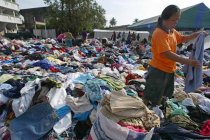 Last few days, whenever I reviewed Sven Beckert’s Empire of Cotton, one of several key points I hoped we made had been exactly how Beckert connects the exploitation of cotton upon the individuals worldwide as not just main into the development of capitalism but additionally closely attached to the way the development and production of cotton fiber consistently exploit consumers. Once I look at this quite interesting essay from the issue of made use of clothing contributions, I thought that presents many other issues with this problem. In present decades, our garments purchases have actually skyrocketed regarding backs on Bangladesh laborers. The reduced expense and low-quality implies that we have been also donating clothing at record prices. But Goodwill among others can’t continue, because we don’t buy which used garments, while there is much of it, and because so much from it is falling apart. So what does which means that? Two significant things. First, some gets sent to landfills. 2nd, they dump it on bad nations. That in turns undermines neighborhood garments production, which in turn gets to a point Beckert tends to make over and over, which will be that western pushed local manufacturers off production through a number of means, including making garments so cheap that residents couldn't compete. That’s basically what we do today.
Last few days, whenever I reviewed Sven Beckert’s Empire of Cotton, one of several key points I hoped we made had been exactly how Beckert connects the exploitation of cotton upon the individuals worldwide as not just main into the development of capitalism but additionally closely attached to the way the development and production of cotton fiber consistently exploit consumers. Once I look at this quite interesting essay from the issue of made use of clothing contributions, I thought that presents many other issues with this problem. In present decades, our garments purchases have actually skyrocketed regarding backs on Bangladesh laborers. The reduced expense and low-quality implies that we have been also donating clothing at record prices. But Goodwill among others can’t continue, because we don’t buy which used garments, while there is much of it, and because so much from it is falling apart. So what does which means that? Two significant things. First, some gets sent to landfills. 2nd, they dump it on bad nations. That in turns undermines neighborhood garments production, which in turn gets to a point Beckert tends to make over and over, which will be that western pushed local manufacturers off production through a number of means, including making garments so cheap that residents couldn't compete. That’s basically what we do today.
It turns out that market, born entirely of your unwanted duds, is thriving. Robert Goode has Mac Recycling, a company that vessels huge bales of used clothing purchased from charities to purchasers all over the world every week. “Pretty much it is possible to pick any nation and there’s a market for those things, ” he says. The worldwide roster ranges from Central and South America to Asia, Africa, and Europe. Though textile recyclers have actually endured their share of misunderstanding, they give you an inarguably important service to charities. To put it in figures, the U.S. at this time exports a billion weight of used clothes annually. Without the intervention of textile recyclers, our huge surplus of non-profit donations would be rendered ineffective and sent to landfills.
Nevertheless, this design is not even close to perfect. Dr. Andrew Brooks, mcdougal of Clothing Poverty, contends that the circulation of Western clothes to establishing nations negatively impacts all of them by disrupting neighborhood economies and putting textile workers out of jobs. Like, industry for utilized clothes has expanded therefore dramatically in Uganda that it now makes up about 81 percent of clothing acquisitions. Brooks additionally points to Ghana, where textile and garments employment fell by 80 per cent between 1975 and 2000. In Sub-Saharan Africa, the continual flood of used clothing is really pervading so it’s even part of the language. Inside the guide, Brooks translates the colloquial Ghanaian phrase “obroni wawu” to “clothes associated with lifeless white guy.”











